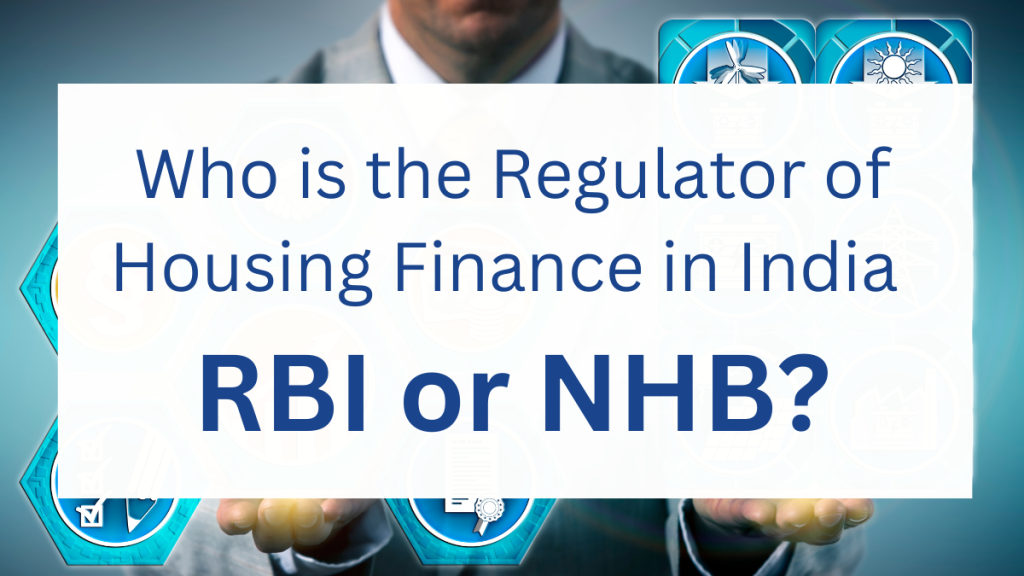Hello students! If you’re here, it’s likely you’re exploring the intricate world of housing finance in India. Today, we’re going to approach a question that’s both essential and often confusing: Who exactly is the regulator of housing finance in India in 2024? Is it the Reserve Bank of India (RBI) or the National Housing Bank (NHB)? Buckle up as we analyze this topic, decipher the roles of these two significant entities, and shed light on what it means for you as a student or an aspiring finance professional.

The Dual Guardians of Housing Finance
In the domain of housing finance, two distinct forces shape the environment: the Reserve Bank of India (RBI), the central authority overseeing monetary reliability and financial regulation, and the National Housing Bank (NHB), the focused promoter and assistant of housing finance. While the RBI sets the comprehensive regulatory tone, the NHB continues to champion housing development and policy support. Together, they create a dynamic balance in India’s housing finance environment.
The Reserve Bank of India (RBI)
First, let’s talk about the Reserve Bank of India (RBI). Established in 1935, the RBI is India’s central bank and a pivotal financial authority. The RBI’s primary functions include:
- Monetary Policy: Developing and implementing monetary policy to maintain price consistency and assure the country’s economic growth.
- Regulation and Supervision: Regulating and monitoring financial institutions like banks to maintain financial consistency and public confidence in the banking system.
- Currency Issuance: Issuing and managing the currency.
- Developmental Role: Supporting economic growth and development through various initiatives.
When it comes to housing finance, the RBI plays an overarching role in regulating the financial environment within which housing finance operates. This includes setting interest rates that influence housing loan rates and overall credit availability in the economy.
The National Housing Bank (NHB)
Now, onto the National Housing Bank (NHB). Established in 1988 under the National Housing Bank Act, 1987, NHB is a wholly owned subsidiary of the RBI. Its innovation was aimed at fostering housing finance institutions both at local and regional levels and providing financial and other support to such institutions. Key functions of NHB include:
- Endorsement and Development: fostering and developing housing finance institutions.
- Regulation and Supervision: Regulating housing finance companies to ensure their soundness and efficiency.
- Refinance Facility: Providing refinance to housing finance institutions to boost their lending capacity.
- Policy Formulation: Working with the government and other stakeholders to formulate policies related to housing finance.
The Evolution of Roles: RBI and NHB
To truly understand the current regulatory environment, we need to look back at how the roles of the RBI and NHB have evolved over time. For many years, NHB was the primary regulator for housing finance companies. It supervised and regulated these institutions, ensuring they operated in a safe and sound manner.
However, in recent years, there have been meaningful changes. In 2019, the Government of India decided to transfer the regulation of housing finance companies from NHB to the RBI. This decision was part of a broader strategy to simplify and strengthen the regulatory structure of the financial sector.
Why the Shift?
The rationale behind this shift was multifaceted:
- Integrated Regulation: Bringing housing finance companies under the scope of the RBI was aimed at creating an integrated regulatory framework. This would help in better monitoring and supervision of these companies, aligning them with the broader financial sector regulations.
- Strengthened Oversight: The RBI, with its extensive experience and resources, was better positioned to oversee the housing finance sector, ensuring greater balance and efficiency.
- Reducing Fragmentation: Consolidating regulation under one authority helped reduce fragmentation and potential regulatory arbitrage, where companies might utilize differences between regulators to their advantage.
The Current Scenario: 2024 and Beyond
As of 2024, the regulation of housing finance companies rests primarily with the RBI. This means that the RBI is responsible for setting the regulatory guidelines and supervising housing finance companies to ensure they operate in a safe, sound, and efficient manner.
Key Responsibilities of the RBI in Housing Finance
- Regulatory Framework: The RBI sets the prudential norms and regulatory guidelines for housing finance companies, covering aspects like capital capacity, asset classification, and provisioning.
- Supervision and Inspection: The RBI conducts regular inspections and audits of housing finance companies to ensure compliance with regulatory norms and to assess their financial health.
- Consumer Protection: The RBI assures that housing finance companies adhere to fair practices, protecting the interests of borrowers and endorsing transparency in lending practices.
- Crisis Management: In times of financial distress or crisis, the RBI has the tools and resources to step in and stabilize the housing finance sector, ensuring systemic stability.
The Role of NHB in 2024
While the regulatory authority has shifted to the RBI, the NHB continues to play an important role in the housing finance environment. Its responsibilities now focus more on development and promotion rather than direct regulation:
- Promotion of Housing Finance: NHB continues to promote housing finance institutions and works towards expanding access to affordable housing finance.
- Refinancing: NHB provides refinance support to banks and housing finance companies, helping them to boost their lending capacity and reach.
- Policy Support: NHB works with the government and other stakeholders in constructing policies related to housing finance and housing development.
Why This Matters to You as a Student
Understanding the regulatory structure of housing finance in India is essential for several reasons:
- Career Opportunities: If you’re aspiring to work in the financial sector, particularly in housing finance, knowledge of the regulatory environment is important. It will help you understand the functioning of housing finance companies and their compliance requirements.
- Academic Insight: For those studying finance, economics, or related fields, understanding the roles of RBI and NHB will deepen your academic knowledge and provide a practical perspective on regulatory practices.
- Informed Decision-Making: If you plan to take a home loan in the future, understanding the regulatory environment will help you make informed decisions regarding your financing options.
Historical Context: The Evolution of Housing Finance Regulation in India
To appreciate the current regulatory framework, it’s essential to understand the historical context. The regulation of housing finance in India has undergone meaningful changes over the decades.
Pre-1988: The Early Years
Before the foundation of NHB in 1988, housing finance in India was largely unorganized. The primary sources of housing finance were commercial banks and cooperative societies, but there was no specialized institution focusing solely on housing finance.
1988-2019: The Era of NHB
The establishment of the National Housing Bank marked a meaningful shift in the housing finance environment. NHB was given the mandate to promote and regulate housing finance institutions. During this period, NHB played an important role in the development of the housing finance sector, introducing various initiatives to increase the availability of affordable housing finance.
Post-2019: The Transition to RBI
In 2019, the regulation of housing finance companies was transferred from NHB to RBI. This move aimed to bring a more integrated and resilient regulatory system under the scope of the central bank, leveraging its broad experience and resources.
Conclusion
In 2024, the regulation of housing finance in India is primarily the responsibility of the Reserve Bank of India (RBI). This shift from the National Housing Bank (NHB) to the RBI is part of a broader approach to unify and strengthen the regulatory system for financial institutions. While the RBI oversees the regulatory and supervisory aspects, NHB continues to play a vital role in endorsing housing finance and supporting policy formulation.
For students and aspiring finance professionals, understanding this regulatory environment is important. It not only improves your academic knowledge but also prepares you for potential career opportunities in the housing finance sector. So, keep this information handy, as it will absolutely serve you well in your academic and professional voyage.
For more resources and study materials, don’t forget to check out the thorough study pages on ixamBee, which offer a wealth of information and tools to help you excel in your exams and career. Happy learning!.
A career in RBI and NHB is a coveted and fulfilling aspiration for many students, and ixamBee is an important ally in this journey. By leveraging ixamBee’s RBI Grade B mock test and NHB mock tests, students can simulate real exam scenarios, refining their time management skills and honing their exam strategies. The platform’s timely RBI Grade B notifications ensure that students remain informed about important dates and any modifications to the exam schedule. Furthermore, ixamBee’s extensive study materials like RBI Grade B online courses, and NHB online courses delve deeply into all essential topics, providing comprehensive explanations and ample practice questions. These robust resources facilitate thorough preparation, bolster confidence, and substantially arise the likelihood of triumph in the RBI and NHB exams.
To help you prepare 50% faster for competitive exams, ixamBee provides free Mock Test Series and all the Current Affairs in English and Current Affairs in Hindi in the BeePedia capsules for GA Preparation. You can also get the latest updates for Bank PO, Bank Clerk, SSC, RBI Grade B, NABARD, and Other Government Jobs.
Also Read:
How to start RBI Grade B Exam preparation from scratch?
How Tough is the RBI Grade B Exam?
Everything you Need to Know about the NHB 2024 Notification











